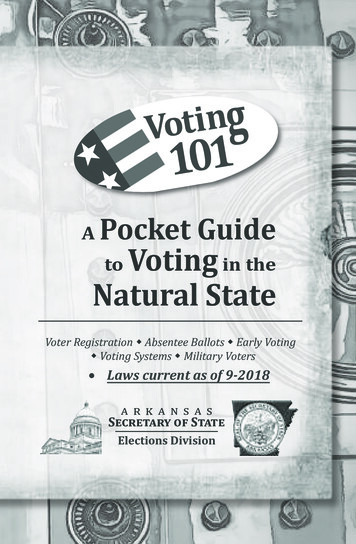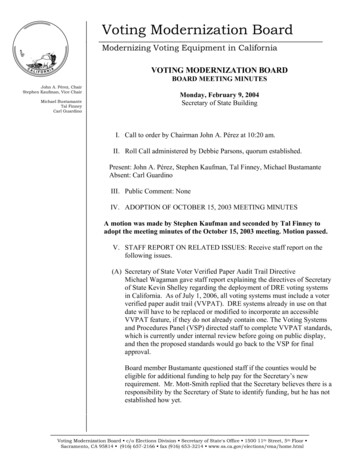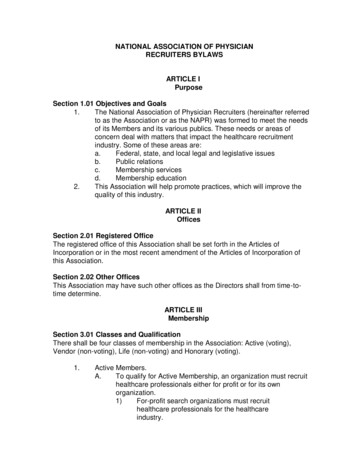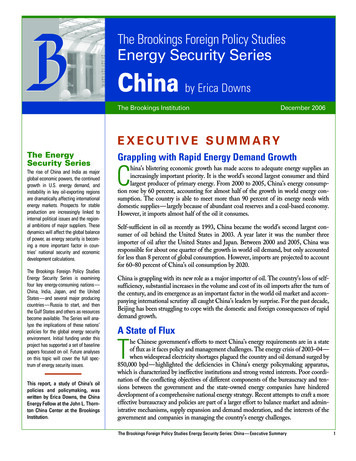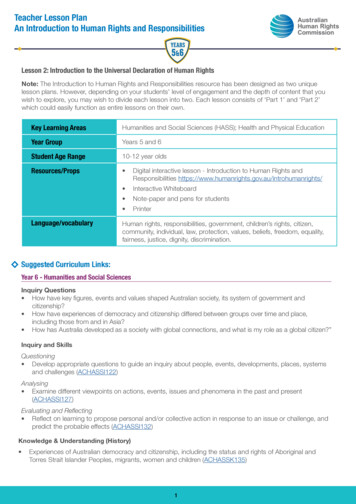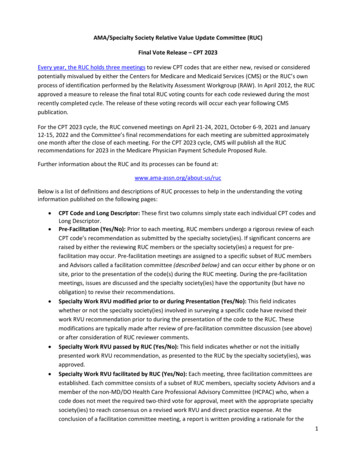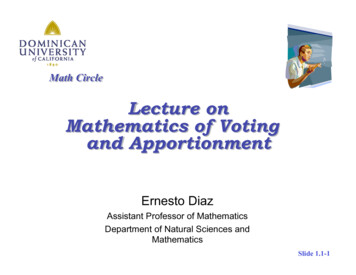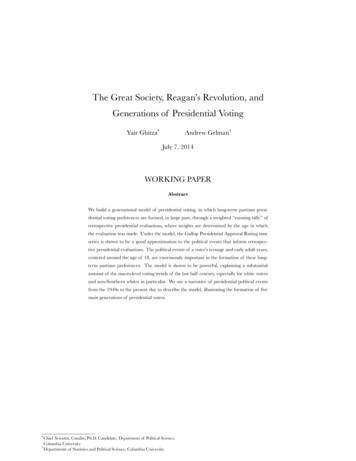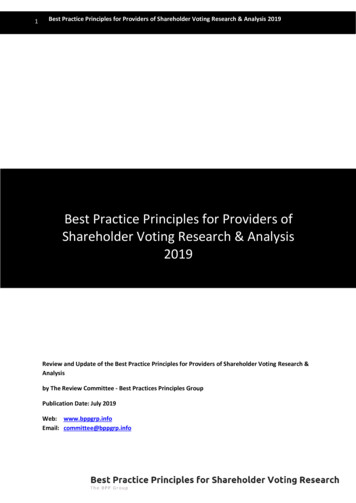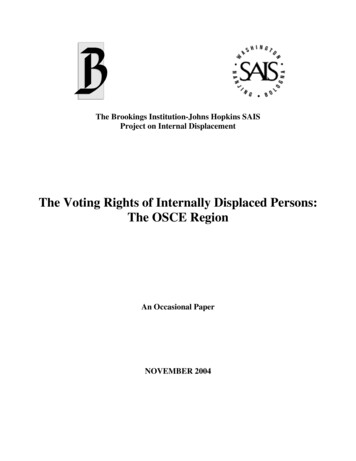
Transcription
The Brookings Institution-Johns Hopkins SAISProject on Internal DisplacementThe Voting Rights of Internally Displaced Persons:The OSCE RegionAn Occasional PaperNOVEMBER 2004
The Voting Rights of Internally Displaced Persons:The OSCE RegionbyErin Mooney and Balkees JarrahTHE BROOKINGS INSTITUTION-SAIS PROJECT ON INTERNALDISPLACEMENT1775 Massachusetts Avenue, N.W., Washington, D.C. 20036-2188and 1717 Massachusetts Avenue, Suite 607, NW, Washington DC 20036TELEPHONE: 202/797-6489 FAX: 202/797-6003 EMAIL: bjarrah@brookings.edu
FOREWORDIn September 2000, our Project produced its first study examining the extent to whichinternally displaced persons were able to exercise their right to political participation,covering four countries in the OSCE region. We were pleased when the OSCEsubsequently decided that the voting rights of internally displaced persons were an issuewarranting “special scrutiny.”To assess and assist the OSCE’s efforts in this regard, the Project decided to expand thestudy to incorporate all thirteen countries of the OSCE in which there are internallydisplaced populations. Undertaking this second, more comprehensive study, alsoprovided an opportunity to update earlier findings and show the progress that has beenmade in a number of countries to enhance the ability of internally displaced persons toexercise their right to political participation, in particular their right to vote.At the same time, the findings of this study show that large numbers among theapproximately three million IDPs in the OSCE region continue to face obstacles inexercising their right to vote, sharply reducing their influence over the many political,economic and social decisions affecting their lives. To address these concerns, the studyputs forward a number of recommendations for particular countries as well as for theOSCE to ensure greater and more systematic attention to the voting rights of theinternally displaced.The initial findings of this report were presented to an OSCE Supplementary HumanDimension Meeting on Electoral Standards and Commitments held in Vienna, 15-16July, 2004. As a result, the meeting concluded that the OSCE should mainstream theissue of IDP voting rights into its electoral work. This final report is being made availableat the OSCE Supplementary Human Dimension Meeting on Internally Displaced Personsto be held in Vienna, 4-5 November, 2004, which also will address the voting rights ofthe displaced. It is our hope that this report will encourage and assist the OSCE, itsparticipating states and civil society partners to devote greater attention to the politicalparticipation of internally displaced persons and also will serve to stimulate similarefforts in other parts of the world as well.We are most grateful to Erin Mooney, Deputy Director, and Balkees Jarrah, ResearchAssistant, of the Project for their painstaking work in preparing this report.Finally, the views presented in the paper are the authors’ alone and should not be ascribedto the co-directors, trustees, officers, and other staff members of the Brookings Institutionor of the Johns Hopkins University School of Advanced International Studies (SAIS).Roberta CohenFrancis M. DengCo-DirectorsBrookings-SAIS Project on Internal Displacement
TAESCentral Election CommissionDemocratic People’s Party (Turkey)Democratic Party of TurkmenistanInternational Federation for Human RightsInternational Covenant on Civil and Political RightsInternational Crisis GroupInternally Displaced PersonIslamic Movement of UzbekistanInternational Organization for MigrationInternational Republican InstituteLocal Election CommissionMinistry of Refugees and Accommodation (Georgia)North Atlantic Treaty OrganizationNational Liberation ArmyNorwegian Refugee CouncilOffice for Democratic Institutions and Human RightsUnited Nations Office for the Coordination of Humanitarian AffairsOrganization for Security and Cooperation in EuropeParticipatory Election Project (IOM)Kurdistan Workers’ Party (Turkey)Representative of the UN Secretary-General on Internally Displaced PersonsState Election CommitteeTurkish Republic of Northern CyprusUnited Nations High Commissioner for RefugeesUnited Nations Interim Administration Mission in KosovoUN Transitional Authority for Eastern Slavonia
ACKNOWLEDGMENTSThe authors would like to express their appreciation to Dr. Simon Bagshaw who in 2000,undertook for the Brookings Project a study exploring the political participation ofinternally displaced persons in four countries in the OSCE region. This study, InternallyDisplaced Persons and Political Participation: The OSCE Region, provided an excellentfoundation, as well as the inspiration, for this expanded paper.Our appreciation is also expressed to Jeremy Grace, Research Coordinator at theInternational Organization for Migration’s Participatory Elections Project and consultantto the International Foundation for Elections Systems, who served as a reader of thisstudy and provided valuable comments and insight based on his extensive experience asan election observer. Thanks too go to Cecilia Piazza of the Office of the Representativeof the UN Secretary-General on Internally Displaced Persons, who previously servedwith UNMIK and OSCE in Bosnia and Herzegovina and Kosovo, and reviewed all of thecase studies.The authors would also like to acknowledge the following individuals who commentedon particular case studies: Dina Abousamra, Christophe Beau and Jens-HagenEschenbächer of the Global IDP Project, Norwegian Refugee Council; Lisa Jones,OCHA-New York; Julia Kharashvili, IDP Women’s Association, Georgia; Anna Morck,Norwegian Refugee Council, Georgia; Peter Neussl, OCHA Internal DisplacementDivision; Oleh Protsyk and Harald Schenker, European Centre for Minority Issues; andVanja Škoric, GONG, Croatia.In addition, numerous individuals were consulted in the course of the preparation of thisstudy who shared their insight and expertise filling in gaps in documented information. Inparticular, the authors wish to thank: Darko Aleksov, MOST Citizen's Association,Former Yugoslav Republic of Macedonia; Mike Amitay, Washington Kurdish Institute;Ruzanna Baghdasaryan, OSCE Office in Yerevan, Armenia; Ambassador Robert Barry,United States Ambassador (retired) and Head of the OSCE Election Support Team Afghanistan; Mercè Castells, OSCE Mission to Bosnia and Herzegovina; GiorgiChkheidze, Georgian Young Lawyers Association; Jeff Fischer, InternationalOrganization for Migration’s Participatory Election Project and International Foundationfor Elections Systems; Sergo Kavtaradze, Central Electoral Commission of Georgia;Gilles Saphy, Election Adviser, OSCE Office for Democratic Institutions and HumanRights; Tim Straight, Norwegian Refugee Council, Armenia; Jonathan Sugden, HumanRights Watch, London; and Marie-Carin von Gumppenberg, OSCE Center in Tashkent,Uzbekistan. The assistance of Daniel Cohn, a research intern with the Project in August2003, also is gratefully acknowledged.Special thanks go to Roberta Cohen for editing the report and to Charles Driest for hisfine assistance with its production.
TABLE OF CONTENTSINTRODUCTION. 1THE ROLE OF THE OSCE IN PROTECTING THE VOTING RIGHTS OFINTERNALLY DISPLACED PERSONS . 5ARMENIA . 10AZERBAIJAN. 14BOSNIA AND HERZEGOVINA . 19CROATIA. 25CYPRUS . 30GEORGIA . 32FORMER YUGOSLAV REPUBLIC OF MACEDONIA . 42MOLDOVA . 46RUSSIAN FEDERATION . 49SERBIA AND MONTENEGRO, INCLUDING KOSOVO . 54TURKEY . 61TURKMENISTAN . 64UZBEKISTAN . 66CONCLUSIONS AND RECOMMENDATIONS. 68ENDNOTES . 71APPENDICESAppendix A – Upcoming Elections 2004 . . . . . 93Appendix B – Map of Internal Displacement in the OSCE Area . . . .94
INTRODUCTIONThe principle of universal and equal suffrage, guaranteeing that every person who hasthe right to vote is able to exercise this right without distinction of any kind, extends,needless to say, to persons who are internally displaced. Safeguarding for internallydisplaced persons (IDPs) the ability to freely and fully exercise this right is thereforeessential. Doing so is important not only on its own merits but also for enabling theinternally displaced, who so often are marginalized, to have a say in decisions that affecttheir lives. Indeed, in countries experiencing internal displacement, the enfranchisementof the internally displaced is an important measure of the effectiveness and legitimacy ofthe overall electoral process and resulting governance structures. Moreover, because theholding of free and fair elections is a key component of repairing and rebuilding dividedpost-conflict societies, an inclusive electoral process can be critical for an effectivereconciliation process and, therefore, also for sustainable peace and security.1Article 21 of the Universal Declaration on Human Rights stipulates that “[e]veryone hasthe right to take part in the government of his country, directly or through freely chosenrepresentatives” and through “periodic and genuine elections which shall be by universalsuffrage”.2 This right has been codified in a range of international and regional humanrights instruments.3 In particular, Article 25 of the International Covenant on Civil andPolitical Rights (ICCPR) provides that “every citizen shall have the right and theopportunity to vote and be elected at genuine periodic elections which shall be byuniversal and equal suffrage”. No distinctions are permitted on grounds of race, color,sex, language, religion, political or other opinion, national or social origin, property, birthor other status. Nor are “unreasonable restrictions” permitted. In this connection, theHuman Rights Committee, which is the body that interprets application of and monitorscompliance with the ICCPR, has specified that if residence requirements apply to voterregistration, they must be reasonable and should not be imposed in such a way as toexclude the homeless from the right to vote. Indeed, the Committee has stressed that“[s]tates must take effective measures to ensure that all persons entitled to vote are ableto exercise that right.” 4The Guiding Principles on Internal Displacement, which restate established norms ofinternational law and specify their application in situations of displacement, expresslyaffirm the right of the internally displaced to vote. 5 Principle 22(1)(d) provides thatInternally displaced persons, whether or not they are living in camps, shallnot be discriminated against as a result of their displacement in theenjoyment of [t]he right to vote and to participate in governmental andpublic affairs, including the right to have access to the means necessary toexercise this right.Principle 29 (1) reaffirms the right of IDPs “to participate fully and equally in publicaffairs at all levels” upon return or resettlement. Moreover, an overarching principle to allof the rights and guarantees articulated in the Guiding Principles is Principle 1(1),1
affirming that IDPs “shall enjoy in full equality, the same rights and freedoms underinternational and domestic law as do other persons in their country. They shall not bediscriminated against in the enjoyment of any rights and freedoms on the ground that theyare internally displaced.”It was important to include in the Guiding Principles these provisions protecting thevoting rights of IDPs because it had been determined that these rights routinely were atrisk of being violated in situations of internal displacement. As the Representative of theUN Secretary-General on Internally Displaced Persons, Francis M. Deng, pointed out,IDPs “often are stripped of the opportunity to participate in government on a local ornational basis.” A contributing factor in the denial of this right, he observed, was IDPs’loss of identification papers and property. And yet, he emphasized, the ability of IDPs toparticipate in governmental and public affairs is important because it can enable them toinfluence, and possibly ameliorate, their own situation of displacement and theauthorities’ responses to their needs.6An analysis of IDPs’ political participation in selected countries of the Organization forSecurity and Cooperation in Europe (OSCE) was prepared by the office of theRepresentative and published by the Brookings Project in 2000.7 The OSCE region, withapproximately 3 million IDPs, was selected as the scope for this study for two mainreasons. The first was the particular emphasis given by the OSCE and the increasinglyactive role of its Office for Democratic Institutions and Human Rights (ODIHR) inpromoting and supporting the holding of democratic elections in its member states.Secondly, the issue of IDPs’ political participation had been identified as a particularconcern in a number of the Representative’s country missions and other activities in theOSCE region.8The study, which focused on elections in Bosnia and Herzegovina, Croatia, Georgia andthe Russian Federation, concluded that IDPs were unable to vote on a par with nondisplaced citizens owing either to practical difficulties posed by situations ofdisplacement or deliberate policies by national and local authorities. To address theseconcerns, the study recommended the effective promotion and implementation of theGuiding Principles on Internal Displacement and other relevant international standards,including OSCE commitments, as benchmarks against which to measure nationalpolicies, laws and practices regarding the political participation of IDPs. It encouragedthe OSCE/ODIHR, given its key role in supporting electoral processes, to activelyidentify barriers to IDPs’ political participation and to promote the necessary reforms.The study was distributed at the OSCE Supplementary Human Dimension Meeting onMigration and Internal Displacement, held in 2000, which recommended that “it shouldbe a matter of special scrutiny whether IDPs can freely exercise their right to vote.”9With a view to helping the OSCE sharpen its focus on the issue of IDPs’ voting rights,this paper assesses the extent to which IDPs throughout the OSCE region are able toexercise their right to vote. It begins by tracing and assessing developments in theOSCE’s attention to the voting rights of the internally displaced. The paper then providesan updated and more comprehensive analysis of IDP voting rights in the OSCE, coveringall 13 countries in the OSCE region affected by internal displacement.10 Specifically, this2
paper examines and assesses respect for the voting rights of IDPs in Armenia, Azerbaijan,Bosnia and Herzegovina, Croatia, Cyprus, Georgia, the Former Yugoslav Republic ofMacedonia, Moldova, Serbia and Montenegro, the Russian Federation, Turkey,Turkmenistan and Uzbekistan. Each case study:1)briefly outlines the background of the displacement situation;2)discusses the national legal and policy frameworks regulating the electoralparticipation of IDPs;3)reviews the extent to which IDPs have been able to exercise their right tovote in specific elections, identifying particular obstacles that haveimpeded their exercise of this right as well as any measures put in place tofacilitate IDP voting;4)provides a sketch of election monitoring efforts and the extent to whichthey have included attention to the voting rights of IDPs; and5)puts forth recommendations for improving for IDPs in each country theirability to access and exercise their right to vote.The paper concludes with a summary of its key findings and recommendations.The paper is based on a review and analysis of national legislation and policies, OSCEelection monitoring reports, other reports evaluating electoral practices in the countriesconcerned, studies on the situation of IDPs, and media reports on elections. Specialmention should be made of the considerable body of literature on the conduct of electionsthat is produced by the OSCE/ODIHR. Also noteworthy is the material on the politicalparticipation of forced migrants prepared by the Participatory Elections Project of theInternational Organization for Migration. 11 The review of primary and secondaryliterature was complemented by interviews and exchanges of correspondence with anumber of individuals and organizations involved in election monitoring, includingOSCE field staff, organizations monitoring and reporting on the conditions of IDPs inOSCE countries, and with civil society and international agencies directly engaged withassisting internally displaced populations in the specific countries.The importance of devoting greater attention to protecting the voting rights of IDPs isnow well recognized by the OSCE. As this study demonstrates, in an increasing numberof situations of internal displacement, OSCE/ODIHR election monitors have worked tointegrate attention to IDPs’ electoral participation and advocate the adoption of correctivemeasures where barriers to their participation exist. There are also cases wheregovernments within the OSCE region have amended electoral legislation and practices toremove restrictions impeding IDPs from freely and fully exercising their right to vote.At the same time, there remains significant scope and need for further action on thisissue. While in a number of countries there have been marked improvements to safeguardthe voting rights of IDPs, in several cases there has been little or no progress on the issue;in fact, some case studies even reflect a degree of regression. In some of the casescovered by the 2000 study, the reasons for IDPs’ inability to participate in the electoralprocess on the same terms as other citizens persist today, while the additional cases3
studied echo many of the difficulties earlier observed. Often, the problems experiencedby IDPs in exercising their right to vote are the result of weaknesses of the electoralprocess in general. The case studies nonetheless suggest that IDPs in the OSCE regionface a number of particular obstacles to exercising their vote. These barriers include: lack of documentation; discriminatory practices; obsolete and restrictive residence requirements, i.e. propiska; inadequate arrangements for absentee voting; lack of timely and adequate information about IDP voting arrangementsbeing provided both to IDPs themselves as well as to electoral officials;and insecurity and acts of intimidation.Furthermore, the OSCE/ODIHR’s attention to the voting rights of IDPs varies, oftensignificantly, from case to case. Whereas in some cases OSCE/ODIHR has been at theforefront of efforts promoting and working to ensure protection of IDP voting rights, inother cases it appears not to have taken up the issue at all. Indeed, in some countriesthere is little to no information available with regard to IDP voting and sometimes evenwith regard to the location and condition of the IDP population itself. Restrictions insome states on OSCE/ODIHR or other international election monitoring activities andeven on domestic election monitoring efforts further compound this gap in information.This report draws attention to a range of obstacles – legal, political and practical – thatstand in the way of the electoral participation of the internally displaced. It also makesrecommendations towards removing these obstacles and enabling IDPs to freely and fullyexercise their right to vote. It is to be hoped that its findings will assist governments ineffectively discharging their national responsibility towards internally displacedpopulations and also assist the OSCE and other organizations active in monitoringelections to promote and protect the voting rights of the internally displaced.Moreover, though focused on the experience in the OSCE region, this study should alsoprove instructive in other parts of the world in encouraging electoral monitoring for IDPsand highlighting ways of improving national laws, policies and practices to enable thedisplaced to freely and fully exercise their right to vote.4
THE ROLE OF THE OSCE IN PROTECTING THE VOTINGRIGHTS OF INTERNALLY DISPLACED PERSONSIn recognition that “pluralistic democracy and the rule of law are essential for ensuringrespect for all human rights and fundamental freedoms,” OSCE participating stateshave collectively committed to build democratic societies based on free elections and therule of law. They have “declare[d] that the will of the people, freely and fairly expressedthrough periodic and genuine elections, is the basis of the authority and legitimacy of allgovernment.” Accordingly, they have committed themselves to “respect the right of theircitizens to take part in the governing of their country, either directly or throughrepresentatives freely chosen by them through fair electoral processes” and to “guaranteeuniversal and equal suffrage to adult citizens.”12In 1990, the OSCE established the Office for Free Elections to promote and supportOSCE states in meeting these commitments. To reflect its expanded mandate, in 1992this institution was renamed the Office for Democratic Institutions and Human Rights(ODIHR). ODIHR plays a leading role in Europe in the field of election observation andassistance. It coordinates and organizes the deployment of several observation missionsevery year, with thousands of election observers, to assess whether elections in the OSCEarea are in line with national legislation and international standards. It also providestechnical assistance to assist OSCE states to improve their national electoral framework.With some 3 million IDPs in 13 different countries across the OSCE region, theinternally displaced represent a sizeable group of electors. It is therefore critical that theissue of electoral participation by IDPs receives the attention of the OSCE. To be sure,there are a number cases where OSCE field missions have been actively engaged inmonitoring and reporting on the voting rights of IDPs; particularly noteworthy in thisregard are the cases of Bosnia-Herzegovina and Kosovo, where the OSCE was mandatedwith primary responsibility for organizing and conducting the electoral process. Overall,however, the OSCE’s attention to IDP voting rights has been largely ad hoc andinconsistent from one country to the next. The principle of universal and equal suffragesurely requires a comprehensive and systematic approach.In recent years, the OSCE has recognized the need to devote greater attention to the issueof IDPs’ voting rights. At the OSCE’s Supplementary Human Dimension Meeting onMigration and Internal Displacement in 2000, where the Brookings Project’s first studyon the issue was distributed, participating states recommended that “[t]he OSCE should,as part of its reporting and monitoring activities, regularly review the situation of IDPs”and that “[d]uring election observation, it should be a matter of special scrutiny whetherIDPs can freely exercise their right to vote.”13It is also significant that the OSCE Ministerial Council in 2003 decided to “take intoaccount the UN Guiding Principles on Internal Displacement as a useful framework forthe work of the OSCE and the endeavors of participating states in dealing with internaldisplacement.”14 The Guiding Principles, it will be recalled, affirm the right of IDPs tovote. At the same meeting the Ministerial Council also adopted a resolution on elections,5
emphasizing the importance, “drawing on expertise from the ODIHR, to consider theneed for additional commitments on elections, supplementing existing ones”.15 AlthoughIDPs were not specifically mentioned, it is significant that this resolution recognized theneed to expand the scope of the OSCE’s standard election-related activities.It is noteworthy in this regard that an October 2003 progress report providing aninventory of existing election-related norms, commitments, principles and best practicesof the OSCE as regards democratic elections 16 made no mention of IDPs and thedifficulties they faced in exercising their right to vote, this despite the fact that a numberof related issues were raised. For instance, the report stressed that:Secure mechanisms should be implemented to permit absentee voting bypersons who are temporarily away from their area of residence, especiallyif such persons are residing internally. The absence of a permanentresidence should not prevent an otherwise qualified person from beingregistered as a voter.17It was underscored that arrangements for absentee voting were particularly important toenabling the enfranchisement of voters “who are away from their home areas, especiallyif they are located elsewhere on national territory.”18 No mention was made of IDPs, forwhom absentee voting arrangements are often the only safe and practical means ofenabling them to vote.In connection with the Supplementary Human Dimension Meeting in July 2004, theOSCE circulated, in addition to this progress report, a discussion paper on futurechallenges for democratic elections in the OSCE region and the possible need foradditional commitments.19 This document also did not contain any reference to IDPs orthe challenges they face in exercising their right to vote. In a discussion of the right touniversal and equal suffrage, for example, the paper states that enabling citizens to takeadvantage of this right requires states to take positive action to “facilitate the participationof women, inclusion of minorities, access for disabled persons, and other groups thatexperience barriers to participation in elections.” The particular problems experienced byIDPs surely would have warranted mention in this context. In addition, given that theelectoral registration of displaced voters has repeatedly proven problematic in pastelections in the OSCE, the paper’s discussion of voter registration20 also would havebenefited from a clear reference to displaced persons. The lack of attention paid in thesepolicy documents to the difficulties faced by IDPs in exercising their right to vote appearsout of step with the OSCE’s earlier call for the voting rights of IDPs to be a matter of“special scrutiny”.Taking into account these oversights, which were pointed out in a presentation togetherwith a summary of the obstacles that IDPs in the OSCE experience in exercising theirright to vote,21 the Supplementary Human Dimension Meeting concluded that the OSCEshould mainstream the issue of IDPs’ voting rights into its electoral work. Austria, whichwas among those countries that particularly welcomed the attention drawn at the meetingto the issue of IDP voting rights, suggested that “even though one might think that the6
Organization has amassed sufficient experience in this field, there is still a lot thatremains to be done in the conceptual and practical area.”22Indeed, gaps in the integration of displacement issues in the OSCE election-relatedactivities also are evident in the OSCE Election Observation Handbook, which outlinesthe general methodology of OSCE election observation and lays out a set of practicalguidelines for the conduct of election observation missions. 23 In the context of voteridentification and registration, the Handbook merely mentions that large-scaledisplacement “can cause significant population shifts between elections” and notes that“identifying and registering large numbers of voters who have moved is a substantialtechnical undertaking.”24 Little guidance is provided, however, on the need and ways toassess the opportunities for electoral participation that are open to displaced populations.In its discussion of special voting arrangements, the Handbook points out that:Providing mobile ballot boxes and absentee voting broadens theparticipation of the electorate. However, these are provisions that can beopen to abuse and therefore jeopardize confidence in the electionprocess.25The emphasis therefore appears to be more on the risks than the benefits that specialvoting arrangements can pose to the electoral process. For IDPs, however, mobile ballotboxes and absentee voting arrangements are often the safest and most practical means ofenabling them to exercise the right to vote. Furthermore, a set of suggested questions touse in monitoring absentee voting arrangements focuses on doing so in military barracks,prisons and hospitals26 and fails to make mention of the importance of such provisions insituations of displaceme
1775 Massachusetts Avenue, N.W., Washington, D.C. 20036-2188 and 1717 Massachusetts Avenue, Suite 607, NW, Washington DC 20036 TELEPHONE: 202/797-6489 FAX: 202/797-6003 EMAIL: bjarrah@brookings.edu
